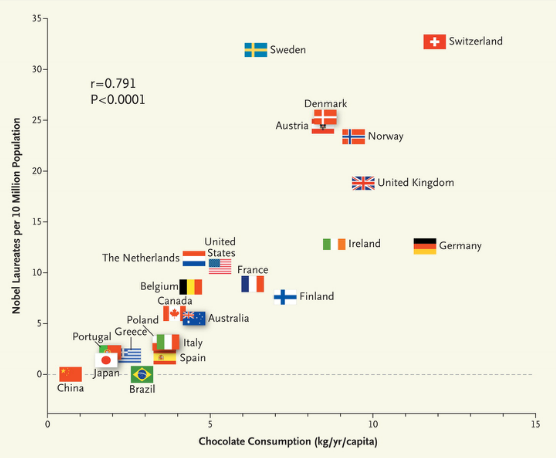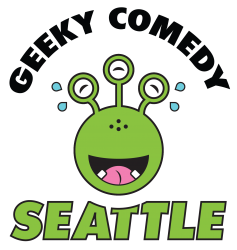I’ve mentioned a while ago that I’d write a post focussing on how to win a Nobel Prize. Recently, a 10 simple rules paper (something I mentioned in that same post) was published on that exact subject, reminding me that I should step on it and write already.
So, here we go, inspired by conversations with friends and that paper I just mentioned (1), some guidelines on how to win a Nobel Prize.
- Eat chocolate and drink milk.
It has been suggested a few years ago that the suspicious relation between the number of Nobel Prize winners in Switzerland might be related to chocolate consumption (2). Obviously, as a Belgian (though the chocolate consumption of Belgians seems to be suspiciously low) and chocolate fiend, I found this very interesting. A follow-up study suggested that the consumption of milk (3) might also play a role, something I don’t expect to be a problem either. In the end, both articles were more of an illustration of how correlation and causality can easily get mixed up in (amateur) statistics, rather than encouraging people to stock up on milk and coco. Eating habits aren’t very likely to increase your chances of winning a Nobel Prize, but one can hope that loving chocolate can’t hurt…
Correlation between Countries’ Annual Per Capita Chocolate Consumption and the Number of Nobel Laureates per 10 Million Population (2). 
Correlation between countries’ annual per capita milk consumption and the number of Nobel laureates per 10 million population (3). - Choose your contacts wisely
Nowadays, most Nobel Prizes are won by a group of 3 people. Additionally, most science is done through collaborations nowadays. Different backgrounds, expertise, points of view and even different disciplines mixed together, provide for good science and innovative discoveries. So collaborate, but not with too many people. If you’re not yet in a position to collaborate (I assume that’s easier once you’re a principal investigator), choose your workplace wisely. Perhaps working in the same institution or even directly in the laboratory of a Nobel Prize laureate and gain from his or her experiences, will provide you with the inspiration to win your own Prize. For example, 9 staff members of the Medical Research Council (MRC) Laboratory in Cambridge have won Nobel Prizes. And if you can’t find such a position, another strategy is to pick your family wisely. Sometimes children of Nobel Prize winners go on to win the prize themselves, as has been shown already seven times. But since choosing what family you’re born into isn’t exactly practical, perhaps consider marrying a prospective Nobel Prize winner, as four married couples have won the prize, as was the case for the Nobel Prize in Physiology and Medicine last year (1). - Serendipity.
A topic I have brought up before but sheer luck, or a certain degree of serendipity, seem to have an effect on your chances of winning a Nobel Prize. Andre Geim and colleagues were messing around with some scotch tape and that led to a Nobel Prize, and penicillin is a similar example. Sometimes things going wrong are not such a bad thing. Often great discoveries are made “by accident”. If your experiment doesn’t go as expected, perhaps it’s time to re-analyse: is it through faulty protocols or maybe because of wrong assumptions. Challenge everything you do, ask questions, and if something cool and unexpected happens, maybe this is something worth looking in to? - Life sciences are the bomb.
The article (1) mentions that Biology is the field in if you’re aiming for a noble prize. There’s still so much to be discovered in biology, and it’s forever changing (evolution, my dear Watson). It often needs interdisciplinary approaches, making it easy to do collaborative research (see point 2). And there are two Nobel Prize categories you can aim for, so more chance! - Just have fun.
But most importantly (and strongly emphasised in (1)), don’t aim for a Nobel Prize. Science shouldn’t be about winning prizes or aiming for fame. Science and research are about curiosity, wanting to know how the world works, finding solutions that can help humans and the earth, and most of all, about having fun. You should be in research because that is what you love. If you feel a great sense of accomplishment when you successfully finish an experiment or make a beautiful and informative microscopy image, if you squeal like a fan girl when you read about novel scientific breakthroughs, if you make plans with your friends to do “Friday afternoon experiments” (yes, that’s doing research just because you want to), then go into research. Perhaps you’ll win a Nobel Prize one day. Probably not. And who cares, you’re doing what you love.
Related to that, Switzerland is great. In the week I’m busy busy busy working, in the weekends I feel like I’m on holiday, riding on boats on Zürichsee and whatnot. In this country where people actually stop to let you cross the road or hold tram doors because they think you’re trying to catch it, I feel quite at home. Maybe it’s because of the wonderful weather and the delicious chocolate, but the first weeks have been great. I think I will enjoy my time here.

References and Inspirations:
(1) Roberts RJ (2015) Ten Simple Rules to Win a Nobel Prize. PLoS Comput Biol 11(4): e1004084. doi:10.1371/journal.pcbi.1004084
(2) Messerli FH (2012) Chocolate consumption, cognitive function, and Nobel Laureates. N Engl J Med 2012; 367:1562-1564. doi:10.1056/NEJMon1211064
(3) Linthwaite S, Fuller GN (2013) Milk, chocolate and Nobel prizes, Pract Neurol13:63. doi:10.1136/practneurol-2012-000471


Just to follow up.. I had the chance to attend once a beautiful lecture from a Nobel Laureate, Prof. Dan Shechtman. In the lecture, after a brief introduction on quasi-crystals (the discovery that earned him the Nobel Prize), he proceeded in a story-tale on how he obtained this dreamt achievement. He was studying something completely different when he observed something unexpected and, in theory, impossible. The page of his notebook reported on the Nobel Prize documents shows a big question mark on one of the sample (mine are plenty of question marks… maybe one day…..). So, as you said in point (3), Serendipidy! But also, as he suggested, write everything down! The smallest clue may turns out to be really useful! It was a long way from that to the Nobel Prize, full with obstacles and other researchers trying to prove him wrong, but what he pointed out is that he did not stop to believe in his studies, he kept following his passion on the subject, knowing that it could have been ended in nothing. I cannot reproduce here how beautiful and inspiring his talk was, but I think you centred the most important point: have fun, love what you are doing, cultivate your dedication.